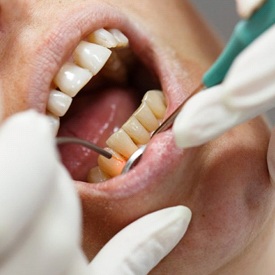Periodontal Therapy – Arnold, MO
Prevent Tooth Loss and More

If your hands bled every time you washed them, that would be cause for concern, wouldn’t it? Yet many people do nothing if their gums bleed when they brush and floss. They brush it off as a normal, harmless occurrence, when the truth is, it’s anything but that. Bleeding gums are a sign that you might have periodontal, or gum, disease. This is a serious condition that’s the number one cause of adult tooth loss in the United States. That’s why it’s crucial to seek treatment in the form of periodontal therapy right away. Read more about gum disease treatment down below, and be sure to contact us if you have any further questions.
What Is Gum Disease?

Gum disease is a chronic inflammatory disease of the gum tissue that surrounds and supports the teeth. Left untreated, this condition can have far-reaching effects – it has been linked to serious general health issues affecting the cardiovascular and respiratory systems, as well as diabetes and, unfortunately, tooth loss.
Periodontal disease is caused by a bacterial infection in the gum tissue, which is more often than not brought about by poor dental hygiene. Skimping out on your regular checkups and cleanings and refraining from daily brushing and flossing increases accumulation of dental plaque and tartar. These biofilms are chock full of harmful bacteria that can set off a chain reaction of inflammation in the gum tissue. Be sure to brush and floss diligently to keep these bacteria at bay.
Symptoms of Gum Disease

If you know what to look for, you can get to our office before your gum disease does serious damage. Some of the most common symptoms include:
Red, Swollen Gums
One of the first signs of periodontal disease includes swelling along the gumline that results in a red color instead of the usual pink. Your gums may also feel tender and bleed easily when your brush or floss.
Chronic Bad Breath
The more plaque and tartar you have, the more bacteria are in your mouth. When bacteria feast on the foods you eat, they leave behind a foul-smelling waste product that affects your breath.
Smaller-Looking Gums
If your teeth appear longer than they used to, it could be due to a receding gumline. When gum disease takes hold, gums start separating from the teeth, creating pockets.
Shifting Teeth
Gum disease can attack the structures that keep your teeth firmly anchored in place, making them move around or loosen.
Sensitive Teeth
When your gums recede, the sensitive layer of the tooth underneath the enamel – called the dentin – is exposed, causing discomfort when exposed to hot or cold stimuli.
Gum Disease Treatment Options

The first stage of gum disease, called gingivitis, usually can be improved with an increased oral hygiene regimen. However, the next stage of gum disease, known as periodontitis, can wreak more permanent havoc on your teeth and gums, and requires more extensive treatment, like scaling, root planing, and antibiotic therapy.
Scaling and Root Planing
We will use special tools to clean above and below the gumline, thoroughly removing bacteria along the way. This is known as scaling. Root planing is the smoothing of the tooth’s root, which lowers the risk of reinfection. Scaling and root planing, also known as a dental deep cleaning, can be performed with anesthesia or sedation for your total comfort during the procedure.
Antibiotic Therapy
Sometimes, a dental deep cleaning on its own is not enough to heal the gums after periodontal disease develops. Because gum disease is a bacterial infection, antibiotic therapy can help kill the bacteria that causes it. During a scaling and root planing treatment, your dentist may choose to apply an antibiotic directly to the infection site to speed the rate of healing and reduce your risk of reinfection. We may also prescribe an antibiotic in pill form for you to take.
